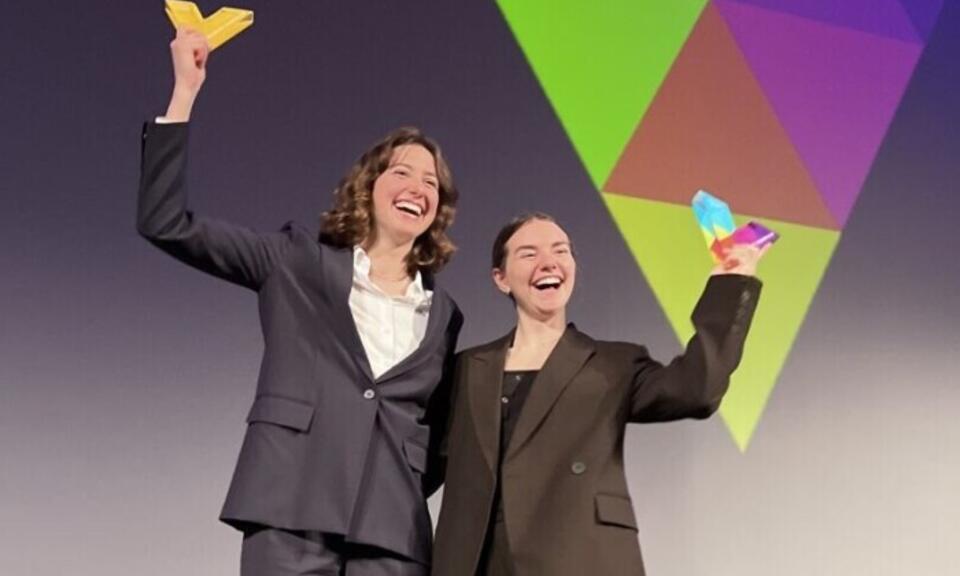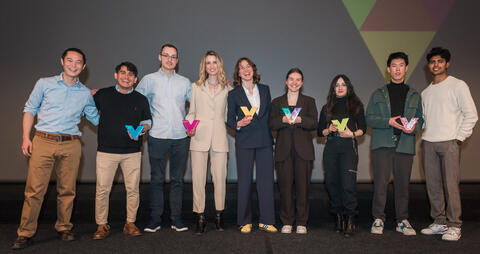
Cyanoskin, a pioneering startup, emerged victorious in Imperial’s Venture Catalyst Challenge (VCC) 2024 with their groundbreaking 'living paint' technology designed to transform buildings into CO2-absorbing structures. Co-founded by Antoinette Nothomb (MSc Innovation, Entrepreneurship and Management alumnus) and Emma Money (Royal College of Art alumnus), Cyanoskin secured the top prize of £30,000, showcasing their innovative approach to addressing climate change. This win underscores the ongoing commitment of the Imperial Venture Catalyst Challenge to nurture and support early-stage ventures, with a track record of success stories including Notpla and Breathe Battery.
Antoinette Nothomb, co-founder of Cyanoskin, said: "Emma and I are absolutely thrilled about winning the VCC final. However, what struck us most profoundly was that winning wasn't merely about the financial reward.
Throughout the programme, we experienced a large sense of support from the VCC and its network. At any point, and any time when help was needed, it was quickly provided by the VCC through their incredible network. While the financial prize is certainly appreciated, what truly matters is the trust placed upon our company by VCC and Imperial College London. We feel well-equipped to continue this journey. Now if we do talk about the financial aspect, yes, we are indeed ecstatic.
This funding enables us to further our research at the Advanced Hackspace and prepare for the launch of our very first pilot in September 2024."
The challenge, spanning a three-month programme, saw participation from 25 teams, each vying for a portion of the £100,000 prize fund, the largest of its kind in any UK university entrepreneurship competition. Divided into five distinct tracks—AI & Robotics, Creative & Consumer, Digital & Finance, Energy & Environment, and Health & Wellbeing—the competition provided a platform for startups to showcase their ingenuity and potential impact.
Cyanoskin's solution resonated strongly with sustainability managers globally who are grappling with limited budgets and the urgent need to achieve net zero targets. Their 'living paint' offers an efficient and cost-effective means of reducing carbon emissions and pollution in urban areas. By leveraging photosynthetic paint that mimics the CO2-absorbing properties of algae, building owners can actively contribute to environmental sustainability while receiving real-time updates on their carbon absorption progress through a dedicated app.
Alongside Cyanoskin, other standout winners were recognised for their exceptional contributions to innovation. BrainMod, for their work on wearable neurotechnology and AI therapeutics, secured the top Moonshot Prize of £10,000, underscoring their commitment to pushing the boundaries of technological advancement. Polaron, recipient of the second Moonshot Prize, was lauded for their efforts in leveraging generative AI to accelerate the design of advanced materials.
Pyri's innovative wildfire detection system, which utilises biocompatible materials for extensive and cost-effective coverage, earned them the top Social Impact Prize of £10,000. Similarly, Tulibot's development of real-time subtitling smart glasses for the deaf community garnered them the second Social Impact Prize, highlighting their dedication to fostering inclusive communication.
In addition to these remarkable achievements, individual track winners across various domains were celebrated for their innovative endeavors. From AminoAnalytica's virtual screening software accelerating drug discovery to Neubond's wearable devices aiding stroke mobility rehabilitation, each winner exemplifies the spirit of innovation and impact driving the Venture Catalyst Challenge forward.

